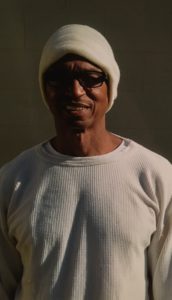 This is Ernest Parker, proud father and grandfather. His warmth runs deeper than the smile. His friends speak of him fondly, and I recently had the privilege of reading a letter he wrote, in which he described a fellow inmate. Of his friend, he said, “His smile is like a beacon of light shining in the valley of despair.” While speaking so highly of his friend, Ernest Parker also described his home as the ‘valley of despair’. His home of nearly three decades has been a federal prison.
This is Ernest Parker, proud father and grandfather. His warmth runs deeper than the smile. His friends speak of him fondly, and I recently had the privilege of reading a letter he wrote, in which he described a fellow inmate. Of his friend, he said, “His smile is like a beacon of light shining in the valley of despair.” While speaking so highly of his friend, Ernest Parker also described his home as the ‘valley of despair’. His home of nearly three decades has been a federal prison.
A few weeks before Christmas, 1990, Ernest Parker – Parker Bey to his friends – pled guilty to possession with intent to distribute a mixture containing cocaine base and possession with intent to distribute black tar heroin. Less than two years later, in 1992, Ernest Parker was found guilty of conspiracy with intent to distribute in excess of five kilograms of cocaine while in prison.
That was almost thirty years ago. This coming December, as the rest of us prepare for and celebrate the holiday season, Parker-Bay will begin his twenty eighth year of incarceration. This autumn, he will celebrate his sixty-third birthday inside a prison. When he was first incarcerated, he had a ten year old daughter. She is all grown up now, and has a daughter of her own. Parker-Bay’s granddaughter will turn twelve this year.
Mr. Parker is not alone. He, along with thousands of other grandfathers, are nearing the end of the their lives behind bars, at the same time that we have an administration that is speaking of getting tougher on crime, talking of resorting to the death penalty for some drug crimes.
Parker-Bey was drug dealer. He was not a wealthy man using his status to belittle those he felt beneath him. He was not a murderer. He was not an arsonist. He was not an abuser of children or women. He was not a well-paid doctor writing prescriptions to addicts and abusing his position knowing full well the medical repercussions of his crime. He was not a rapist. He was not guilty of assault or armed robbery. He has never been any of those things, but something he is known as today is a ‘good friend’.
At my request, Mr. Parker wrote to me about his case. In his letter, he shared with me some of his frustration with his former lawyer and how he requested that they do things that were never done. He also spoke of evidence he feels could have helped him that came up missing.
There are things that I know from my own life experiences and what others have shared with me time and time again. Courts aren’t fair. Anyone who thinks they are has not been very involved with them. Guilt and innocence, reality and fiction – those things are often interchangeable in a courtroom. Without talented representation that has your best interests at heart and behaves as your advocate, a person is very likely to experience that reality. Lawyers, prosecutors and judges – they write the story. That is reality, and it is just as real as Parker-Bey’s words to me describing his longtime home as ‘the unwholesome depths of a human warehouse’. Ernest Parker, father, grandfather, good friend, former drug dealer, lives in a human warehouse, one of the thousands stored there as part of America’s failed ‘war on drugs’.
ERNEST PARKER can be contacted at:
Ernest Parker #02816-089
Federal Correctional Institution
P.O. Box 1000
Milan, Michigan 48160
![]()